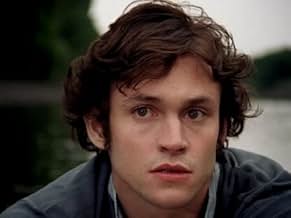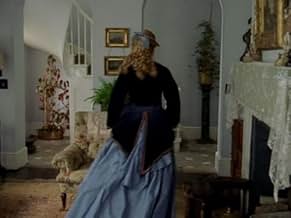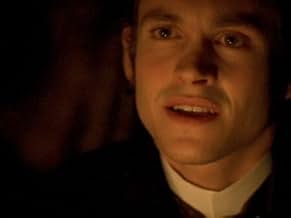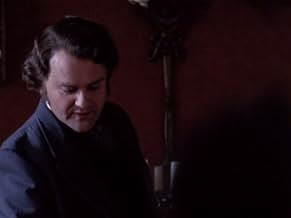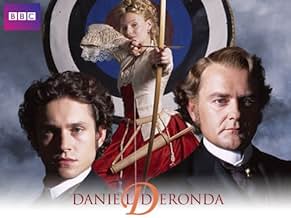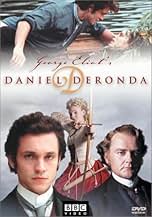Daniel Deronda
- Mini serie TV
- 2002
- 53min
Nella Londra vittoriana, Gwendolen Harleth è attratta da Daniel Deronda, gentiluomo altruista e intelligente di origini sconosciute, ma il suo disperato bisogno di sicurezza finanziaria potr... Leggi tuttoNella Londra vittoriana, Gwendolen Harleth è attratta da Daniel Deronda, gentiluomo altruista e intelligente di origini sconosciute, ma il suo disperato bisogno di sicurezza finanziaria potrebbe distruggere le sue possibilità di felicità.Nella Londra vittoriana, Gwendolen Harleth è attratta da Daniel Deronda, gentiluomo altruista e intelligente di origini sconosciute, ma il suo disperato bisogno di sicurezza finanziaria potrebbe distruggere le sue possibilità di felicità.
- Ha vinto 3 BAFTA Award
- 5 vittorie e 4 candidature totali
Sfoglia gli episodi
Recensioni in evidenza
I'm watching the British series Daniel Deronda every week on Swedish tv, and I will recommned it to everyone who fancies quality literary adaptations. The production values are impeccable, and the acting list very impressive. The one to catch your attention, though, is without a doubt Hugh Bonneville as the supervillain Grandcourt. He's everything a good oldfashioned villain from the 19.th century ought to be: suave, cool, arrogant, manipulative, morally corrupt, and with a razor sharp wit. In fact, he totally overshadows the meek and handsome, but oh so noble and earnest hero, poor Daniel Deronda! Hugh Dancy does his best, but it's hard work to make Deronda as interesting as Grandcourt! Likewise with the heroine. Romola Garai is beautiful to look at, but it's difficult to really care about Gwendolyn. She's such a silly, whiny, and cold person who would rather marry a man she dislikes than stoop to be a governess! It made me long to give her a good whipping! All in all, I think she and Deronda deserve each other, for being so awfully colourless and boring. I'd much rather spend the time watching the villain smirk, or wonder about miss Lapidoth's strange fate, among the Jews. As usual, being the villain pays off! Hugh Bonneville and David Bamber as Lush are the characters you remember! They really are perfectly selfish and dastardly mean!
George Eliot was a truly excellent writer, but 'Daniel Deronda' was perhaps not her best work. This may go some way to mitigating the rather average results that emerge from this adaptation. Intended to be an insightful and complex tale of love, greed, selfishness, prejudice, maturity, and self-knowledge, the film (like the novel) proceeds more like two almost-unconnected stories, neither of which is wildly interesting.
Tying the two plots together is Daniel Deronda, played by Hugh Dancy. Dancy walks his way through, somehow making most of his lines seem redundant. To be fair, acting out a novel that uses extensive narration and introspection can't be easy, but a more experienced actor might have been a better choice to tackle such a tough job. The character of Daniel is a young man on the path of self-discovery, with detours along the way for a bit of romance and a little aimlessness. His relationships with two women form the fabric of the story.
The first tale revolves around the young, pretty, and petty Gwendolen Harleth. Played well, if not spectacularly, by the radiant Romola Garai, she is impetuous and selfish (though usually without intent), thinking that she is and must be the centre of attention. Garai plays her as someone who thinks that she has mastered the world around her, but is in fact nothing more than an indulged child. When her family is virtually ruined financially, she must choose between making a loveless marriage to maintain her high living, or quiet penury in the country. Naturally, she chooses the former. However, what she does not realise is that her suitor, Henleigh Grandcourt, is actually a cold, calculating sadist whose only interest in her is as an item of torment. Grandcourt is played by Hugh Bonneville, the one real stand-out in the production. Bonneville delivers an excellent performance as the deceptive, thoroughly wicked abuser. His Grandcourt is a flint-hearted reptile who first tricks Gwendolen with false kindness and then, when he has her in his grasp, begins to crush her with his cruelty.
Plot two centres on Daniel's relationship with Mirah Lapidoth, a Jewish singer whom he saves from a suicide attempt. Mirah is played by Jodhi May, who is actually rather flat in her delivery. May seems to go in for the "hushed whisper" technique quiet a bit. I suspect the idea was to portray Mirah as a sensitive, troubled woman, but in the end she just seems dull and high-strung. Her search for (and eventual reunion with) her family draws Daniel down a path that he would probably not otherwise have visited, and it has a significant impact on his life.
Good supporting work shores things up a bit, though the screen time is limited. The first comes from Edward Fox as Sir Hugo, Daniel's benefactor, a kindly old man of great wealth who acts as a sort of father to him. The always-excellent Greta Scacchi, looking strikingly haggard in character, is a ghost from Grandcourt's past who comes back to haunt his new bride.
I rate it 6/10.
Tying the two plots together is Daniel Deronda, played by Hugh Dancy. Dancy walks his way through, somehow making most of his lines seem redundant. To be fair, acting out a novel that uses extensive narration and introspection can't be easy, but a more experienced actor might have been a better choice to tackle such a tough job. The character of Daniel is a young man on the path of self-discovery, with detours along the way for a bit of romance and a little aimlessness. His relationships with two women form the fabric of the story.
The first tale revolves around the young, pretty, and petty Gwendolen Harleth. Played well, if not spectacularly, by the radiant Romola Garai, she is impetuous and selfish (though usually without intent), thinking that she is and must be the centre of attention. Garai plays her as someone who thinks that she has mastered the world around her, but is in fact nothing more than an indulged child. When her family is virtually ruined financially, she must choose between making a loveless marriage to maintain her high living, or quiet penury in the country. Naturally, she chooses the former. However, what she does not realise is that her suitor, Henleigh Grandcourt, is actually a cold, calculating sadist whose only interest in her is as an item of torment. Grandcourt is played by Hugh Bonneville, the one real stand-out in the production. Bonneville delivers an excellent performance as the deceptive, thoroughly wicked abuser. His Grandcourt is a flint-hearted reptile who first tricks Gwendolen with false kindness and then, when he has her in his grasp, begins to crush her with his cruelty.
Plot two centres on Daniel's relationship with Mirah Lapidoth, a Jewish singer whom he saves from a suicide attempt. Mirah is played by Jodhi May, who is actually rather flat in her delivery. May seems to go in for the "hushed whisper" technique quiet a bit. I suspect the idea was to portray Mirah as a sensitive, troubled woman, but in the end she just seems dull and high-strung. Her search for (and eventual reunion with) her family draws Daniel down a path that he would probably not otherwise have visited, and it has a significant impact on his life.
Good supporting work shores things up a bit, though the screen time is limited. The first comes from Edward Fox as Sir Hugo, Daniel's benefactor, a kindly old man of great wealth who acts as a sort of father to him. The always-excellent Greta Scacchi, looking strikingly haggard in character, is a ghost from Grandcourt's past who comes back to haunt his new bride.
I rate it 6/10.
The title gave me no clue to the absorbing romantic Victorian drama that was to follow. Said to be George Eliot's last great novel, it exposes in no uncertain manner the pitiful life of the Victorian woman, hardly more than an obedient slave and forced to respond to her husband's demands.
Hugh Bonneville stands out among the excellent cast as the nasty Henleigh Grandcourt who revels in watching women squirm under his aristocratic power and Romola Garai is perfect as Gwendolen who marries him, not for love, but to save her family from economic ruin.
Hugh Dancy in the title role of Daniel has immediate appeal with his handsome good looks touched with both shyness and sadness as he ponders over his past life and the unsolved mystery of his mother's identity.
After Daniel saves a woman from drowning in a river, the story takes an unexpected turn and concentrates on the Jewish problem of a permanent homeland. Daniel is much attracted to the woman he has saved and through his efforts to help her some mysteries of his own life are revealed to him.
The sets, costumes and photography capture exquisitely life in England in the Victorian era. Quite apart from the romantic drama, there is much to ponder over in this story. Thankfully to-day women have gained a degree of independence, though not entirely, and the Jews are still uncertain about the boundaries of their homeland.
I can recommend this film which is in 4 parts. Set aside a full evening to watch the story unfold. It's quite long (205 minutes) but a brilliant production.
Hugh Bonneville stands out among the excellent cast as the nasty Henleigh Grandcourt who revels in watching women squirm under his aristocratic power and Romola Garai is perfect as Gwendolen who marries him, not for love, but to save her family from economic ruin.
Hugh Dancy in the title role of Daniel has immediate appeal with his handsome good looks touched with both shyness and sadness as he ponders over his past life and the unsolved mystery of his mother's identity.
After Daniel saves a woman from drowning in a river, the story takes an unexpected turn and concentrates on the Jewish problem of a permanent homeland. Daniel is much attracted to the woman he has saved and through his efforts to help her some mysteries of his own life are revealed to him.
The sets, costumes and photography capture exquisitely life in England in the Victorian era. Quite apart from the romantic drama, there is much to ponder over in this story. Thankfully to-day women have gained a degree of independence, though not entirely, and the Jews are still uncertain about the boundaries of their homeland.
I can recommend this film which is in 4 parts. Set aside a full evening to watch the story unfold. It's quite long (205 minutes) but a brilliant production.
10hfk
The first time 'round, when PBS initially offered up "Deronda", I watched the first 15 minutes or so and was so disgusted with Gwendolynn that I changed channels and didn't think twice. Second time 'round, based on reviews here at IMDB, I gave it a bit more time and I'm certainly glad that I did. "Deronda" is a powerfull, beautiful, bit of television. I'm a conservative by nature and, on a regular basis, I'm sickened by the politically correct preaching that's often pushed by PBS and Network television. Daniel Deronda like, say "Prime Suspect", is story-telling with a liberal slant that is both legitimate and thought-provoking. I thoroughly enjoyed the story, and the lush production. I'm surprised by the nit-picking about "wooden" acting: I found the acting excellent, particularly compared to the endless trash television that's pumped into the idiot box these days. perhaps this is trite, but "Deronda" actually inspired me, uplifted me and, at least as far as I'm concerned, that's one of the most significant hallmarks of great art. Don't miss it.
The usual lush mini-series adapation from that reliable team, Andrew Davies and the BBC, of a literary property, this time George Eliot's almost forgotten last novel.
Daniel (Hugh Dancy) is the gorgeous if slightly wet boy of mysterious parentage adopted by wealthy amiable old buffer Sir Hugo (Edward Fox). He falls in love with the wrong woman, the beautiful but self-absorbed Gwendolen (Romola Garai). She however is propelled into marriage with ace bounder (and Sir Hugo's heir) Henleigh Grandcourt (Hugh Bonneville). Daniel then becomes interested in Mirah (Johdi May), a promising singer of Jewish background, and through her ailing brother Mordecai (Daniel Evans) the Zionist cause (yes, hotting up as far back as the 1870s). Grandcourt meets a bounder's fate and Gwendolen is now free to marry Daniel, but guess what ?
The costumes are great, the acting impeccable, the photography luminous but the story lacks punch. It is didactic rather than romantic, with metaphorical posters all over the place for women's rights and a homeland for the Jewish people. Hugh Dancy looks right for the part but Daniel is too much of a prig to be very likeable (though he has my sympathy when he discovers that Barbara Hershey, resplendent in a Venetian Palazzo is his mother Greta Scacchi would not have been so bad).
The most engaging characters are Grandcourt the bounder and his sidekick Lush (David Bamber Mr Collins in `Pride and Prejudice') and yet we are meant to despise them both. Gwendolen is sympathetic to the extent she marries Grandcourt to provide financial security for her mother and sisters, but she is a real dork otherwise. Generally the characters lack the panache of say, Trollope's characters in `The Way We Live Now', or Eliot's own in `Middlemarch'. Perhaps Ms Eliot should have quit while she was ahead.
The critics at the time (including Henry James) were baffled by the `Jewish' aspect of the story. It certainly was an outsider's view, yet it rings true today; here Ms Eliot was being prophetic, or was at least aware of the combination of repression, deprivation and myth that could give rise to a successful social movement. In 1876, the year the novel was published, it seemed most unlikely that Palestine would ever become a significant Jewish settlement. Daniel, desperate to find out about his background, finds a cause bigger than himself and eagerly throws himself into it. One has the feeling that Mirah, musically talented though she is, is going to be playing second fiddle.
Anyway, I enjoyed Hugh Bonneville's Grandcourt, a terrific bounder, and David Bamber's Lush (Mr Collins turns bad). And of course, this is Sunday evening stuff, so one mustn't be too picky about the crummy plot and the unsympathetic principals. I usually find myself at this point thinking `I must read the book' (if I haven't already), but this time I don't think I'll bother.
Daniel (Hugh Dancy) is the gorgeous if slightly wet boy of mysterious parentage adopted by wealthy amiable old buffer Sir Hugo (Edward Fox). He falls in love with the wrong woman, the beautiful but self-absorbed Gwendolen (Romola Garai). She however is propelled into marriage with ace bounder (and Sir Hugo's heir) Henleigh Grandcourt (Hugh Bonneville). Daniel then becomes interested in Mirah (Johdi May), a promising singer of Jewish background, and through her ailing brother Mordecai (Daniel Evans) the Zionist cause (yes, hotting up as far back as the 1870s). Grandcourt meets a bounder's fate and Gwendolen is now free to marry Daniel, but guess what ?
The costumes are great, the acting impeccable, the photography luminous but the story lacks punch. It is didactic rather than romantic, with metaphorical posters all over the place for women's rights and a homeland for the Jewish people. Hugh Dancy looks right for the part but Daniel is too much of a prig to be very likeable (though he has my sympathy when he discovers that Barbara Hershey, resplendent in a Venetian Palazzo is his mother Greta Scacchi would not have been so bad).
The most engaging characters are Grandcourt the bounder and his sidekick Lush (David Bamber Mr Collins in `Pride and Prejudice') and yet we are meant to despise them both. Gwendolen is sympathetic to the extent she marries Grandcourt to provide financial security for her mother and sisters, but she is a real dork otherwise. Generally the characters lack the panache of say, Trollope's characters in `The Way We Live Now', or Eliot's own in `Middlemarch'. Perhaps Ms Eliot should have quit while she was ahead.
The critics at the time (including Henry James) were baffled by the `Jewish' aspect of the story. It certainly was an outsider's view, yet it rings true today; here Ms Eliot was being prophetic, or was at least aware of the combination of repression, deprivation and myth that could give rise to a successful social movement. In 1876, the year the novel was published, it seemed most unlikely that Palestine would ever become a significant Jewish settlement. Daniel, desperate to find out about his background, finds a cause bigger than himself and eagerly throws himself into it. One has the feeling that Mirah, musically talented though she is, is going to be playing second fiddle.
Anyway, I enjoyed Hugh Bonneville's Grandcourt, a terrific bounder, and David Bamber's Lush (Mr Collins turns bad). And of course, this is Sunday evening stuff, so one mustn't be too picky about the crummy plot and the unsympathetic principals. I usually find myself at this point thinking `I must read the book' (if I haven't already), but this time I don't think I'll bother.
Lo sapevi?
- QuizThe novel is set in the early 1860s, whereas the adaptation moves the action ahead to 1874, the year that George Eliot began writing the novel.
- BlooperAt Ezra Cohen's store, the baby's left shoe and sock disappear then reappear.
- ConnessioniFeatured in George Eliot: A Scandalous Life (2002)
I più visti
Accedi per valutare e creare un elenco di titoli salvati per ottenere consigli personalizzati
- How many seasons does Daniel Deronda have?Powered by Alexa
Dettagli
- Data di uscita
- Paesi di origine
- Siti ufficiali
- Lingua
- Celebre anche come
- 丹尼爾的半生緣
- Luoghi delle riprese
- Edimburgo, Scozia, Regno Unito(Jewish market scenes)
- Aziende produttrici
- Vedi altri crediti dell’azienda su IMDbPro
Contribuisci a questa pagina
Suggerisci una modifica o aggiungi i contenuti mancanti

